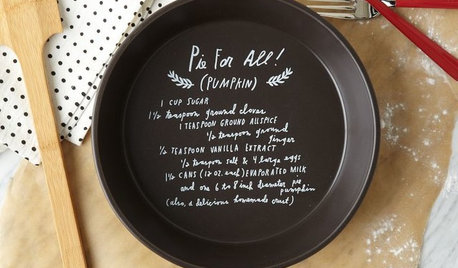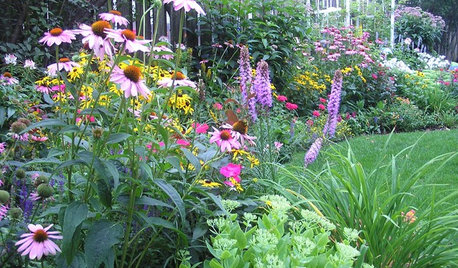Sprayer for Compost Tea
jlaak5
16 years ago
Related Stories

GARDENING GUIDESGet on a Composting Kick (Hello, Free Fertilizer!)
Quit shelling out for pricey substitutes that aren’t even as good. Here’s how to give your soil the best while lightening your trash load
Full Story
GARDENING GUIDESHouzz TV: Make a Worm Bin for Rich Soil and Happy Plants
A worm-powered compost bin that can fit under a sink turns food scraps into a powerful amendment for your garden. Here’s how to make one
Full Story
PRODUCT PICKSGuest Picks: Fall Entertaining Favorites
Make autumn feasts a piece of cake with chic compostable plates, pretty glasses, pie accessories and more
Full Story
GARDENING AND LANDSCAPINGPorch Life: Banish the Bugs
Don't let insects be the bane of your sweet tea and swing time. These screening and product ideas will help keep bugs at bay on the porch
Full Story
MOST POPULAR33 Magic Household Cleaning Tips
Houzzers from around the world share their tips for transforming housework into child’s play
Full Story
SMALL HOMESHouzz Tour: Teatime for a Tiny Portable Home in Oregon
A tearoom, soaking tub and bed of tatami mats recall Japan in this 134-square-foot house on wheels
Full Story
FALL GARDENING5 Ways to Put Fall Leaves to Work in Your Garden
Improve your soil and yard the organic way with a valuable garden booster that grows on trees
Full Story
LANDSCAPE DESIGNTry Slow Gardening for Some Unexpected Benefits
Why set your garden on the fast track? Here's how to relax and enjoy it in an entirely new way
Full Story
GARDENING GUIDESCalifornia Gardener: What to Do in July
Active green thumb or not, top priorities for peak fruit and veggie season: watering, feeding, keeping up with growth
Full Story
GARDENING GUIDESHow to Keep Your Citrus Trees Well Fed and Healthy
Ripe for some citrus fertilizer know-how? This mini guide will help your lemon, orange and grapefruit trees flourish
Full Story





skoot_cat
tumblenes
Related Professionals
Wrentham Landscape Architects & Landscape Designers · Newcastle Landscape Architects & Landscape Designers · Sahuarita Landscape Architects & Landscape Designers · Anderson Landscape Contractors · Fairhope Landscape Contractors · North Chicago Landscape Contractors · River Ridge Landscape Contractors · Antioch Landscape Contractors · Charlotte Driveway Installation & Maintenance · South Lyon Driveway Installation & Maintenance · Columbia Fence Contractors · Lake Jackson Fence Contractors · Maynard Fence Contractors · Silver Spring Fence Contractors · La Puente Fence Contractorsjlaak5Original Author
enigma7
greenjeans_il
iowa50126
greenjeans_il
fescue_planter
greenjeans_il
tey157
rcnaylor
dchall_san_antonio
farmnmike_yahoo_com
sheikyerbouti
jcjky
dchall_san_antonio
stan6
jcjky
lou_spicewood_tx
sunnyside1
takadi
snachs
dchall_san_antonio
takadi
dchall_san_antonio
takadi